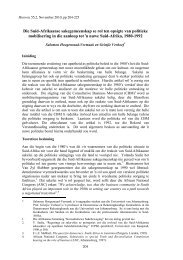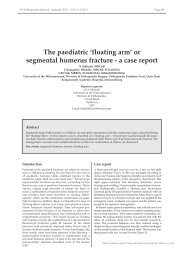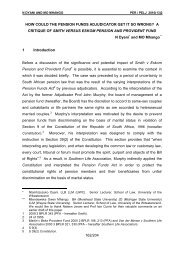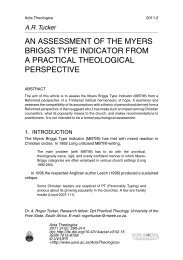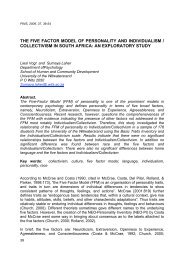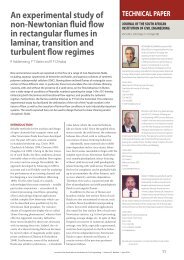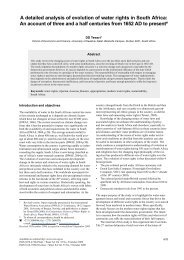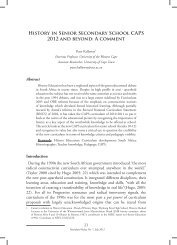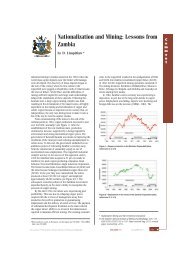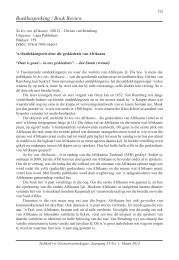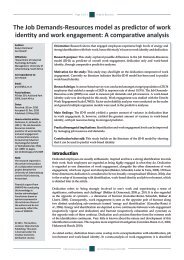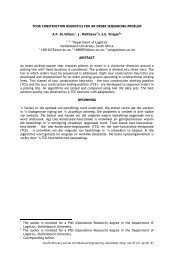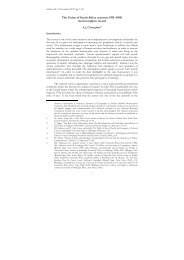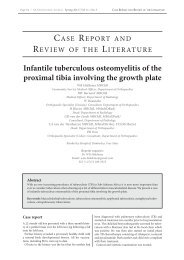91 Hendrik Verwoerd and the Leipzig School of Psychology in 1926 ...
91 Hendrik Verwoerd and the Leipzig School of Psychology in 1926 ...
91 Hendrik Verwoerd and the Leipzig School of Psychology in 1926 ...
You also want an ePaper? Increase the reach of your titles
YUMPU automatically turns print PDFs into web optimized ePapers that Google loves.
<strong>Hendrik</strong> <strong>Verwoerd</strong> <strong>and</strong> <strong>the</strong> <strong>Leipzig</strong> <strong>School</strong> <strong>of</strong> Pscyhology<br />
objective event <strong>and</strong> <strong>the</strong> affectation connected to <strong>the</strong> novelty, to <strong>the</strong><br />
strangeness <strong>of</strong> this event work h<strong>and</strong> <strong>in</strong> h<strong>and</strong> und <strong>in</strong>tensify each o<strong>the</strong>r ... But<br />
soon <strong>the</strong> magical which <strong>in</strong> <strong>the</strong> beg<strong>in</strong>n<strong>in</strong>g only enveloped <strong>the</strong> event becomes<br />
characteristic <strong>of</strong> <strong>the</strong> experience – both characteristics: <strong>the</strong> change <strong>and</strong> <strong>the</strong><br />
magical comb<strong>in</strong>e. Out <strong>of</strong> this emerges <strong>the</strong> idea <strong>of</strong> change through magic – an<br />
idea, which to my m<strong>in</strong>d already implies causality. 95<br />
Volkelt’s subtle shift here from animal psychology to ethnopsychology is<br />
significant. He moves from <strong>the</strong> transformation <strong>of</strong> an enemy <strong>in</strong>to food towards<br />
an explanation <strong>of</strong> magical th<strong>in</strong>k<strong>in</strong>g, which has to bridge <strong>the</strong> “gap” as<br />
surrogate causality.<br />
Racist versions <strong>of</strong> stage <strong>the</strong>ories are closely related to cultural<br />
<strong>the</strong>ories, but <strong>the</strong>y radicalise cultural <strong>the</strong>ories by expla<strong>in</strong><strong>in</strong>g <strong>the</strong> differences<br />
between <strong>the</strong> advances <strong>of</strong> societies <strong>in</strong> terms <strong>of</strong> biological differences. The<br />
assumption that certa<strong>in</strong> exist<strong>in</strong>g societies represent older developmental<br />
stages is expla<strong>in</strong>ed by <strong>the</strong> assertion that <strong>the</strong>y have been unable to catch up<br />
with European civilisation. Racist <strong>the</strong>ories are sceptical <strong>of</strong> <strong>the</strong> perfectibility <strong>of</strong><br />
<strong>the</strong> “o<strong>the</strong>rs”, tak<strong>in</strong>g <strong>the</strong> low stage <strong>of</strong> <strong>the</strong>ir cultural development as evidence<br />
<strong>of</strong> <strong>the</strong>ir limited abilities. In a peculiar circularity, <strong>the</strong>se abilities are used to<br />
expla<strong>in</strong> why <strong>the</strong> “o<strong>the</strong>rs” are less developed; <strong>and</strong> this <strong>in</strong> turn is used as pro<strong>of</strong><br />
<strong>of</strong> <strong>the</strong>ir deficiency.<br />
Ethnopsychology was open to racist explanations that were popular <strong>in</strong><br />
white settler colonies like South Africa from <strong>the</strong> end <strong>of</strong> <strong>the</strong> n<strong>in</strong>eteenth<br />
century onwards. These explanations viewed Africans <strong>and</strong> o<strong>the</strong>r “primitive”<br />
peoples as culturally retarded <strong>and</strong> <strong>the</strong>refore <strong>in</strong>capable <strong>of</strong> catch<strong>in</strong>g up with<br />
Europeans. The reason given was that Africans were stuck with<strong>in</strong> a certa<strong>in</strong><br />
phase <strong>of</strong> development that could be observed <strong>in</strong> <strong>the</strong> psyche <strong>of</strong> <strong>in</strong>dividuals<br />
who had not reached “adult” maturity. This racist assumption conceded that<br />
African children developed similarly to Europeans until puberty, at which<br />
po<strong>in</strong>t a divergence occurred. European children received <strong>the</strong> decisive<br />
impulse for <strong>the</strong>ir <strong>in</strong>tellectual development dur<strong>in</strong>g this phase, while Africans<br />
became so overwhelmed by <strong>the</strong>ir sexual drives that <strong>the</strong>y would never<br />
overcome <strong>the</strong> puberty stage. Dudley Kidd, author <strong>of</strong> a racist book on <strong>the</strong><br />
psychology <strong>of</strong> African children, drew <strong>the</strong> follow<strong>in</strong>g conclusions from this<br />
<strong>the</strong>ory <strong>of</strong> arrested development <strong>in</strong> 1906:<br />
When puberty is draw<strong>in</strong>g to a close, a degenerative process seems to set <strong>in</strong>,<br />
<strong>and</strong> <strong>the</strong> previous efflorescence <strong>of</strong> <strong>the</strong> faculties leads to no adequate fruitage<br />
<strong>in</strong> later life. ... Our ma<strong>in</strong> aim <strong>in</strong> <strong>the</strong> education <strong>of</strong> backward races should be to<br />
draw out, discipl<strong>in</strong>e, <strong>and</strong> streng<strong>the</strong>n <strong>the</strong> various faculties ... <strong>of</strong> <strong>the</strong> children so<br />
95. AWZGP, Volkelt Papers, Box 23, Notes on magic <strong>and</strong> causality. Translated from<br />
<strong>the</strong> orig<strong>in</strong>al German. At about <strong>the</strong> same time Ernst Cassirer came to ra<strong>the</strong>r<br />
different <strong>and</strong> philosophically more substantial <strong>and</strong> consistent conclusions about<br />
mythical th<strong>in</strong>k<strong>in</strong>g <strong>and</strong> causality, see his Philosophie der symbolischen Formen, vol.<br />
2: Das mythische Denken, (Wissenschaftliche Buchgesellschaft, Darmstadt, 1994),<br />
pp 43ff.<br />
115



